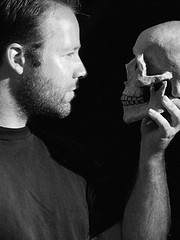In a lively on line debate with a guy who wants to sound way smarter than he is, I was discussing my reasons for liking to see Shakespeare's work taken out of it's original setting, if the Director has a REASON. He goes on, by the way, to claim that Shakespeare was his own best director, citing Hamlet's "Speak the speech, I pray you...." I quote my response:
As far as Shakespeare being the best Director, I highly disagree. The Director as we know him did not really even appear until much later. The primary reason Shakespeare writes such brilliant and specific language in his plays is to tell the actors where they are, what they should be doing, etc. since they were rarely if ever give time to stage anything, and certainly not by a Director with a vision for anything other than getting the play up and seen.
There are two ways of looking at Shakespeare in a creative theatrical way: presenting the story as it is told in the text, and digging into thematic elements that may help to highlight or illuminate the text. As an avid film- and theater-goer, I don’t want to watch RICHARD III done exactly the same way every time. I’d be bored stiff. But when I can watch Pacino do it, then see Ian McKellen’s Third Reich interpretation, then watch Geilgud......... now I’m getting takes on theme, and that interests me.
Henry VI has several parts that cover the entire Wars of the Roses and set in it’s given time period and performed straight as written would take 12 or more hours. Brilliant though it may be, I don’t have that kind of time anymore. But ROSE RAGE takes that story, keeps the language and time period, but dissects it into two three-hour parts and places it all inside a butchery. Why? Because thematically that’s what the Wars of the Roses were: a series of butcheries of two rival English families. The action, costuming and music were all period, but the butcher shop (with it’s hanging chains and two white-clad, masked butchers) stood off to the side and appeared during the torture and murder scenes, of which there are many. It was a brilliant and poignant staging. Not to mention the very end, where Edward is crowned King and they carry him around on a throne singing only to stop like a freeze-frame as Glouster steps forward and looks at the audience to say: "Now is the winter of our discontent made glorious summer....." He winks and the stage blacks out. End of play.
Theatre, film, TV, arguably all forms of art exist for one basic reason: to "hold the mirror up to nature" or, more importantly, to make us FEEL. Even if we are angered or upset, it has done it’s job. And when you’ve seen the same story a million times, you don’t feel it as much anymore, hence my interest in new interpretations of the work.
Opinions?
Saturday, September 20, 2008
In case you cared.....
Subscribe to:
Post Comments (Atom)

No comments:
Post a Comment